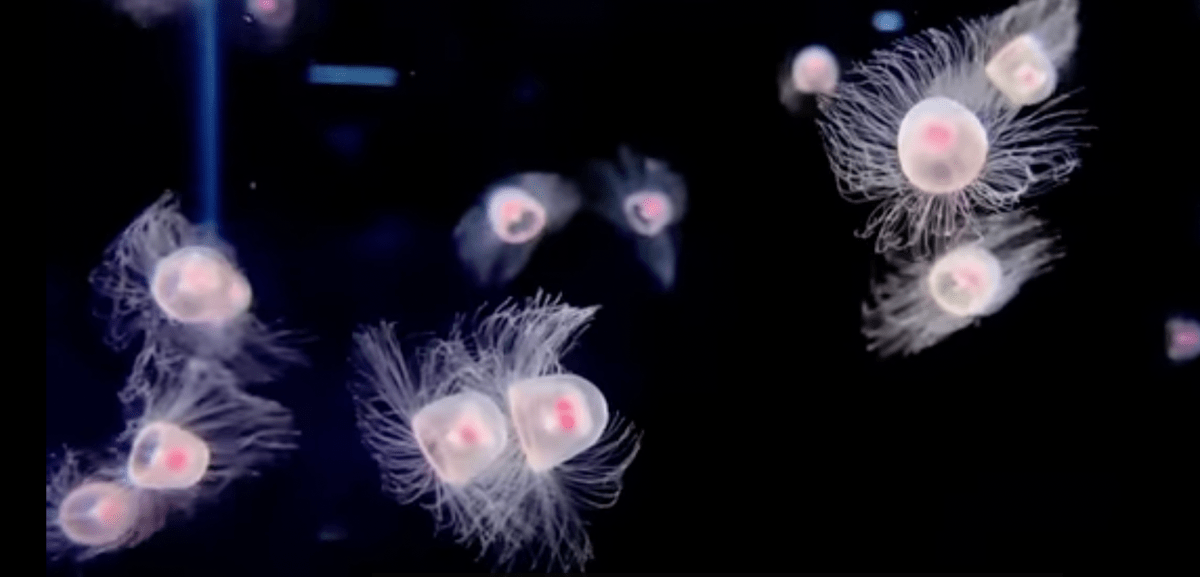About ten years ago I ran across the organism called the immortal jellyfish. Luckily I didn’t get stung because it wasn’t an in-person encounter like while swimming. Rather, I came upon the idea that these guys lived forever. Someone was even selling an immortal jellyfish extract. They claimed it would reverse aging in people.
That sounded like bunk to me, but what caught my attention was the claim that the jellyfish were immortal. This idea seemed highly questionable to me.
Today’s post is a look at squishy claims about these jellyfish. At the same time, there is important research being done with them.

What are immortal jellyfish?
First, what exactly are they?
These supposed immortals are tiny jellyfish in the Mediterranean Sea. Their official scientific name is Turritopsis dohrnii. The immortal jellyfish size is tiny. About 4 mm.
While they can sting a little, it isn’t much of an issue for people.
What has caught people’s attention is that these and some related jellyfish have an unusual response to being damaged. They will sometimes kind of hit rewind when damaged and revert back to a polyp stage. These polyps can then eventually become adult jellyfish again. It seems that the cycle can repeat itself and it’s not clear if there’s a limit. As far as we know, no other animal can do this exact kind of developmental trick.
Are immortal jellyfish actually mortal?
What’s my beef with the term “immortal” jellyfish?
Let’s focus on the big issue. Immortality.
First of all, how could mortal humans know something is immortal? We can’t. So the term “immortal” here is not scientifically accurate in that sense.
More loosely, could people just mean by this adjective here that they don’t have a known limit to their life if you count their new incarnations after damage? I suppose so.
Secondly, individuals can and do die.
Further, there’s another important reality check. Getting back to something I mentioned at the top, there’s no reason to think that these jellyfish or extracts made from them have any regenerative power in people. This reminds me of my fact-check of Prevagen. That “brain supplement” contains a jellyfish substance. I know of no solid reason to think Prevagen would help people’s brains.
What are the oldest immortal jellyfish?
No one knows precisely.
The oldest fossils are from hundreds of millions of years ago so collectively they’ve been around a very long time.
As to individuals and their next generations after damage, they can do this for multiple cycles in the lab. It’s not clear from my reading what the record is for the generations attained and documented in a lab.
Turritopsis dohrnii and cool research
Despite the fact-checking above and their questionable colloquial name, there’s very cool research ongoing on Turritopsis dohrnii. The damage response mentioned earlier relies on adult cells being reprogrammed into a more primitive, stem cell-like state. That behavior is an exciting example of transdifferentiation. So these jellyfish are a neat tool to study mechanisms of transdifferentiation.
A recent PNAS paper sheds new insights into the jellyfish life cycle reversal. It’s entitled “Comparative genomics of mortal and immortal cnidarians unveils novel keys behind rejuvenation.” They found repression of PRC2 activity and expression of pluripotency genes. This implicates pluripotent stem cell programming and possibly cells.
These not-so-immortal jellyfish have also sparked some bigger questions.
If the adult immortal jellyfish reprogram their cells to become polyps and then those polyps become adults again eventually, are they the same animals as before? Or new organisms? It definitely has a cloning-like feel to it.
It also reminds me of the tale of the Ship of Theseus.
Overall, why does the question of accuracy about the name of this jellyfish matter? Scientists should strive to be as accurate as possible. For some things like naming it can be particularly important. As I said, the probably inaccurate “immortal” angle has led to problematic marketing and false hope too.
Good to know—and further pursue with known immortal organisms (hydra?)
Thanks!!!